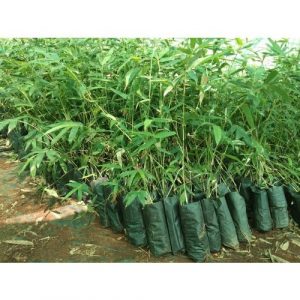Beema Bamboo:

The Tamil Nadu Agricultural University (TNAU) has designed an ‘oxygen park’ within its premises at Coimbatore with Beema Bamboo.
- Beema or Bheema Bamboo is a superior clone, selected from Bambusa balcooa, a higher biomass yielding bamboo species.
- This bamboo clone has been developed by the conventional breeding method.
- This species is considered to be one of the fastest-growing plants. It grows one-and-a-half feet per day under tropical conditions.
- It is said to be the best ‘carbon sink’ to mitigate carbon dioxide emissions.
Bambusa balcooa:
- Bambusa balcooa is a very large, thick-walled, clumping bamboo, growing up to a height of 25 metres, and a thickness of 150 millimetres.
- The length and strength of Bambusa balcooa make it a useful material for the construction industry.
It is a drought-resistant species with low rainfall requirements and can reach yields upwards of 100 metric tons per hectare. - Importance:
- Permanent Green Cover: As it is sterile, this bamboo does not produce any seed and does not die also for several hundred years and keeps growing without death. As a result, this particular bamboo species is able to establish permanent green cover.
- Does Not Require Replanting for Decades: Since the plants are produced through tissue culture, the culms grow almost solid and adapt to different soil and climatic conditions. After every harvest cycle, it re-grows and does not require replanting for decades. A culm is the hollow stem of a grass or cereal plant, especially that bearing the flower.
- Can Mitigate Global Warming and Climate Change: As its rhizome and root formation provide a strong foundation, the plant becomes robust against natural forces and plays a major role in mitigating global warming and climate change.
- Diverse Uses: The bamboo’s calorific value is equal to that of coal. Cement industries are buying this bamboo species for their boilers. Bamboo fibre is used by the textile industry for making fabric and garments. Experts from the Visvesvaraya National Institute of Technology (VNIT), Nagpur, are working on the design of crash barriers made of beema bamboo and coir.




